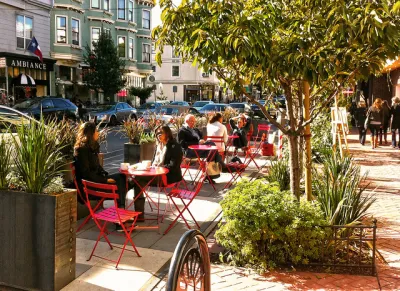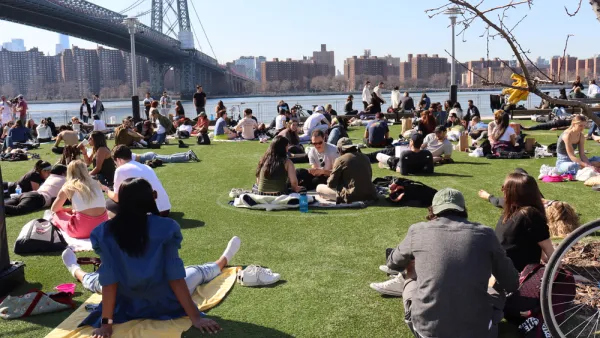The novel coronavirus has so far preyed on the most vulnerable in cities, as a result of the planning failures of the previous century. Planners today can take steps to reverse that reality, if they reclaim their historic role.

Jacob Anbinder, a PhD candidate in history at Harvard University and recommended planning Twitter follow, writes a detailed and thoroughly referenced account of the potential of the pandemic to completely remake the field of planning to effectively respond to the threats of the coronavirus.
The first evidence cited by Anbinder as an indication of the planning profession's capacity to change is the changing face of the workforce since 1973, when only 4 percent of planners were employed outside of the halls of government, to a whopping 28 percent now. The ongoing debate about the future of cities, and the coronavirus's potential to alter the evolution of urban areas, according to Anbinder, "is especially relevant in cities, given that the coronavirus not only takes advantage of the most precarious urban residents but does so by exploiting some of the worst planning failures of recent years."
But the debate, "is really a proxy for the larger debate about whether we can, and want, to resurrect the kind of interventionist government—a government of planners—that we abandoned over the course of the late twentieth century," adds Anbinder.
After detailing the housing market's pre-existing conditions, as a result of decades of obstructionary powers at the local level, not connects to the threat of out-migration from urban areas as well as the hugely disparate public health outcomes of the pandemic, Anbinder calls on planners within city government to "advocate for aggressive policy agendas to make social distancing easier."
Planners must act for forgiveness instead of permission, says Anbinder, in acting aggressively for these ends in the short term, but the long term will require a more fundamental shift:
Locally, however, progressives must cast off the risk-averse approach that has defined their urban policy since the sixties and rediscover the sort of ideology that the New Right feared, one that asserts the coronavirus and other parasites like it—including parasitic forms of state power—thrive in the absence of planning, not the presence of it. Indeed, planners themselves must reassert their profession’s essential role in a vibrant social democracy, not as facilitators of pseudo-democratic input processes but as civil servants entrusted with improving urban life.
FULL STORY: The Post-Planning Pandemic

Analysis: Cybertruck Fatality Rate Far Exceeds That of Ford Pinto
The Tesla Cybertruck was recalled seven times last year.

National Parks Layoffs Will Cause Communities to Lose Billions
Thousands of essential park workers were laid off this week, just before the busy spring break season.

Retro-silient?: America’s First “Eco-burb,” The Woodlands Turns 50
A master-planned community north of Houston offers lessons on green infrastructure and resilient design, but falls short of its founder’s lofty affordability and walkability goals.

Test News Post 1
This is a summary

Analysis: Cybertruck Fatality Rate Far Exceeds That of Ford Pinto
The Tesla Cybertruck was recalled seven times last year.

Test News Headline 46
Test for the image on the front page.
Urban Design for Planners 1: Software Tools
This six-course series explores essential urban design concepts using open source software and equips planners with the tools they need to participate fully in the urban design process.
Planning for Universal Design
Learn the tools for implementing Universal Design in planning regulations.
EMC Planning Group, Inc.
Planetizen
Planetizen
Mpact (formerly Rail~Volution)
Great Falls Development Authority, Inc.
HUDs Office of Policy Development and Research
NYU Wagner Graduate School of Public Service



























